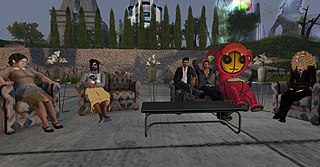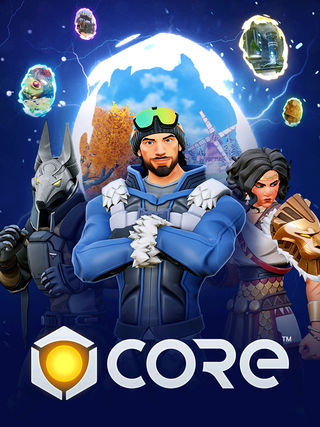In the context of video games, a multiverse can refer to:
Sharded virtual worlds, for example Ultima Online , are similar to multiverse virtual worlds, and sharded virtual worlds occasionally have been described as multiverses. [4] However, travel and communication between instances of sharded virtual worlds (so-called “shards”) are usually less well supported than in typical multiverse video games and often require a server transfer of a player's character. [5]
A common feature of multiverse video games is the possibility to access subgames without leaving the multiverse game. Optional features include a virtual "lobby" that serves as starting point or hub to access subgames, the ability of players to choose and customize an avatar that is used in subgames, the ability of players to communicate with other players of the multiverse even if they are not in the same shared virtual world, and the ability of players to contribute user-generated content to the multiverse, e.g., virtual objects, avatars, or virtual worlds. [3]
Several popular massively multiplayer online games have been compared to the Metaverse due to their wide range of user-generated virtual worlds, [6] [7] but many of these virtual worlds are not persistent worlds and lack seamless long-distance travel. Furthermore, instead of providing a single virtual world shared by all players, these games provide multiple instances of virtual worlds that are shared by a limited number of players. Popular examples include Roblox , Minecraft , Fortnite Creative , VRChat , Rec Room , etc. The term “multiverse” is used to simultaneously communicate similarities and differences between these video games and the concept of the Metaverse. [3] A notable example of this use is Manticore Games’ description of their video game Core as multiverse [2] or “creator multiverse”. [8]
A massively multiplayer online role-playing game (MMORPG) is a video game that combines aspects of a role-playing video game and a massively multiplayer online game.
A massively multiplayer online game is an online video game with a large number of players on the same server. MMOs usually feature a huge, persistent open world, although there are games that differ. These games can be found for most network-capable platforms, including the personal computer, video game console, or smartphones and other mobile devices.

A virtual world is a computer-simulated environment which may be populated by many users who can create a personal avatar, and simultaneously and independently explore the virtual world, participate in its activities and communicate with others. These avatars can be textual, graphical representations, or live video avatars with auditory and touch sensations. Virtual worlds are closely related to mirror worlds.

In computing, an avatar is a graphical representation of a user, the user's character, or persona. Avatars can be two-dimensional icons in Internet forums and other online communities, where they are also known as profile pictures, userpics, or formerly picons. Alternatively, an avatar can take the form of a three-dimensional model, as used in online worlds and video games, or an imaginary character with no graphical appearance, as in text-based games or worlds such as MUDs.

An online game is a video game that is either partially or primarily played through the Internet or any other computer network available. Online games are ubiquitous on modern gaming platforms, including PCs, consoles and mobile devices, and span many genres, including first-person shooters, strategy games, and massively multiplayer online role-playing games (MMORPG). In 2019, revenue in the online games segment reached $16.9 billion, with $4.2 billion generated by China and $3.5 billion in the United States. Since the 2010s, a common trend among online games has been to operate them as games as a service, using monetization schemes such as loot boxes and battle passes as purchasable items atop freely-offered games. Unlike purchased retail games, online games have the problem of not being permanently playable, as they require special servers in order to function.

The metaverse is a loosely defined term referring to virtual worlds in which users represented by avatars interact, usually in 3D and focused on social and economic connection.
Virtual crime, can be described as a criminal act conducted in a virtual world -- usually massively multiplayer online role-playing games, MMORPGs. To grasp the definition of virtual crime, the modern interpretation of the term "virtual" must be assessed to portray the implications of virtual crime. In this sense, virtual crime describes those online acts that “evoke the effects of real crime” but are not widely considered to be prosecutable acts.
The Multiverse Network, Inc. was an American startup company creating a network and platform for massively multiplayer online games (MMOGs) and 3D virtual worlds. Multiverse's stated aim was to lower the barrier of entry for development teams by providing a low-cost software platform for online game and virtual world development.

A sandbox game is a video game with a gameplay element that provides players a great degree of creativity to interact with, usually without any predetermined goal, or alternatively with a goal that the players set for themselves. Such games may lack any objective, and are sometimes referred to as non-games or software toys. More often, sandbox games result from these creative elements being incorporated into other genres and allowing for emergent gameplay. Sandbox games are often associated with an open world concept which gives the players freedom of movement and progression in the game's world. The term "sandbox" derives from the nature of a sandbox that lets people create nearly anything they want within it.
Improbable Worlds Limited is a multinational technology company founded in 2012 and headquartered in London, England. It makes metaverse infrastructure and applications, as well as simulation software for video games and corporate use. It reported revenues of £78m in fiscal 2022, up 260% over 2021.
Roblox is an online game platform and game creation system developed by Roblox Corporation that allows users to program and play games created by themselves or other users. Created by David Baszucki and Erik Cassel in 2004 and released in 2006, the platform hosts user-created games of multiple genres coded in the programming language Lua. For most of Roblox's history, it was relatively small, both as a platform and as a company. Roblox began to grow rapidly in the second half of the 2010s, and this growth has been accelerated by the COVID-19 pandemic.
Virtual goods are non-physical objects and money purchased for use in online communities or online games. Digital goods, on the other hand, may be a broader category including digital books, music, and movies. Virtual goods are intangible by definition.
A database shard, or simply a shard, is a horizontal partition of data in a database or search engine. Each shard is held on a separate database server instance, to spread load.

VRChat is an online virtual world platform created by Graham Gaylor and Jesse Joudrey and operated by VRChat, Inc. The platform allows users to interact with others with user-created 3D avatars and worlds. VRChat is designed primarily for use with virtual reality headsets, being available for Microsoft Windows PCs and as a native app for Android-based headsets such as Meta Quest, Pico 4, and HTC Vive XR Elite. It is also usable without VR in a "desktop" mode designed for either a mouse and keyboard or gamepad, and in an Android app for touchscreen devices.
Decentraland is a 3D virtual world browser-based platform. Users may buy virtual plots of land in the platform as NFTs via the MANA cryptocurrency, which uses the Ethereum blockchain. Designers can create and sell clothes and accessories for the avatars to be used in the virtual world.

NeosVR is a free-to-play, massively multiplayer online, virtual reality application created by Solirax. It was released for free on Microsoft Windows via Steam on May 4, 2018, with support for several VR headsets.

Core is a free-to-play online video game platform with an integrated game creation system, developed by Manticore Games. It was released as an open alpha version on March 16, 2020, and became available as Early Access on April 15, 2021. Core hosts user-generated games that are designed for an older teen and adult audience. Core's game creation system is designed to simplify video game creation in order to allow more individuals to develop games. Manticore Games, the developer of Core, was co-founded by Frederic Descamps and Jordan Maynard in 2016 and is based in San Mateo, California. Core is based on a similar concept as other gaming platforms for user-generated games such as Roblox.
Proximity chat or spatial chat or positional chat is type of internet platform that overlays video teleconferencing software on a virtual world environment, so that users can navigate freely and have conversations among small groups.
Gamefam Studios is an American video game company. It primarily utilizes Roblox as a video game development platform, while also using Fortnite Creative and Minecraft as engines to create maps and minigames. It has produced content for brands such as Sonic the Hedgehog, the National Football League, Hot Wheels, Doctor Strange, Kung Fu Panda, Samsung, and Puma and staged virtual concerts for musicians such as The Chainsmokers and Saweetie.